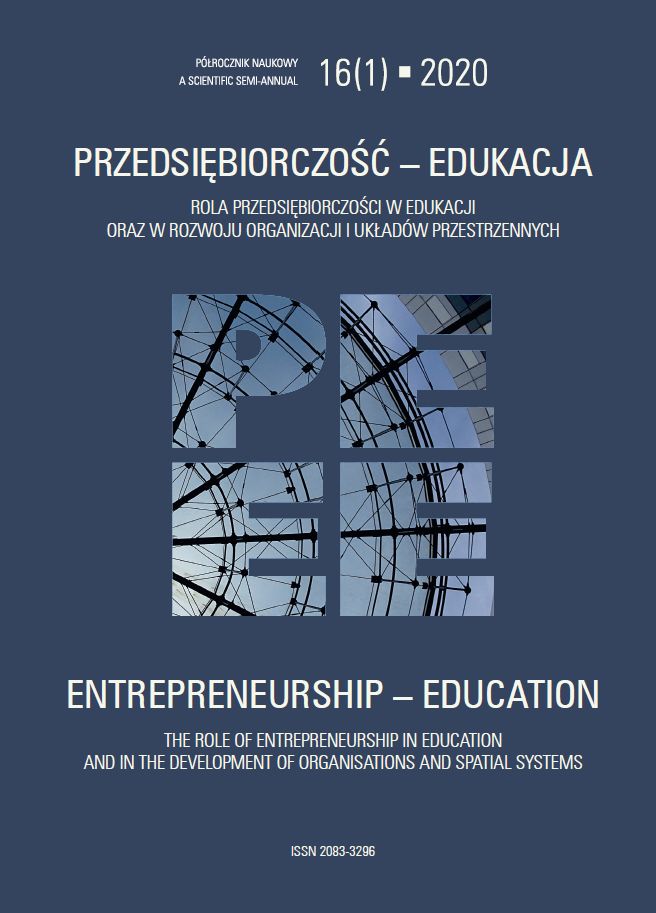Rola edukacji w kształtowaniu postaw sukcesyjnych studentów kierunków ekonomicznych
DOI:
https://doi.org/10.24917/20833296.161.9Słowa kluczowe:
edukacja, postawy sukcesyjne, przedsiębiorczość, przedsiębiorstwa rodzinne, studenci, sukcesjaAbstrakt
W artykule przedstawiono wyniki badań dotyczących intencji sukcesyjnych studentów kierunków ekonomicznych trzech polskich uczelni. Przeanalizowano także problematykę kształtowania edukacji w kontekście stymulowania postaw sukcesyjnych młodych osób rozpoczynających karierę zawodową. Szczególną uwagę zwrócono na możliwości i narzędzia oddziaływania edukacji formalnej na postawy sukcesyjne osób studiujących na kierunkach ekonomicznych. W warstwie teoretycznej artykuł opiera się na wynikach przeglądu literatury naukowej. W części empirycznej wykorzystano metodę badania dokumentów oraz analizę wtórną ilościowych i jakościowych danych zastanych. Przedstawiono wyniki zrealizowanego badania, którym objęto osoby studiujące na kierunkach ekonomicznych w trzech krajowych uczelniach: Szkole Głównej Handlowej w Warszawie, Państwowej Wyższej Szkole Informatyki i Przedsiębiorczości w Łomży oraz Uniwersytecie Gdańskim.
Bibliografia
Apanowicz, J. (2002). Metodologia ogólna. Gdynia: Wydawnictwo Diecezji Pelplińskiej Bernardinum.
Aronoff, C.E., McClure, C.L., Ward, J.L. (2012). Sukcesja w firmach rodzinnych. Ostateczny test wielkości. Kraków: Wydawnictwo MiP.
Brockhaus, R.H. (2004). Family Business Succession: Suggestions for Future Research. Family Business Review, 17(2), 165–177.
European Commission (2009). Final Report of the Expert Group. Overview of Family-Business-Relevant Issues: Research, Networks, Policy Measures and Exiting Studies.
Fleming, Q.J. (2006). Tajniki przetrwania firmy rodzinnej. Gliwice: Helion.
Gersick, K.E., Davis, J.A., Hampton, M., Lansberg, I. (1997). Generation to Generation. Life cycles of the Family Business. Boston: Harvard Business School Press.
Hadryś-Nowak, A., (2019), Międzynarodowe przedsiębiorstwo rodzinne. Znaczenie orientacji przedsiębiorczej sukcesora dla internacjonalizacji przedsiębiorstwa rodzinnego. Warszawa: CeDeWu.
Hall, P.D. (1988). A Historical Overview of Family Firms in the United States. Family Business Review, 1, 51–68.
Handler, W.C. (1994). Succession in Family Business: A Review of the Research. Family Business Review, 7(2), 133–157.
Jeżak, J. (red.). (2014). Przedsiębiorstwa rodzinne w Polsce. Znaczenie ekonomiczne oraz strategiczne problemy rozwoju. Łódź: Wyd. Uniwersytetu Łódzkiego.
Klimek, J., Żelazko, B., Leszczewska, K., Sadkowska, J. (2018). Postawy sukcesyjne studentów kierunków ekonomicznych – aspekt teoretyczny i wyniki badania pilotażowego. Przedsiębiorczość i Zarządzanie, XIX(7/1), 41–56.
Klimek, J., Leszczewska, K., Żelazko, B., Sadkowska, J. (2019). Kluczowe determinanty postaw sukcesyjnych studentów kierunków ekonomicznych. Studia i Monografie. Społeczna Akademia Nauk, 92, 9–24.
Lansberg, L., Astrachan, J.H. (1994). Influence of Family Relationships on Succession Planning and Training: The Importance of Mediating Factors. Family Business Review, 7(1), 39–59.
Le Breton-Miller, I., Miller, D., Steier, P. (2004). Toward an Integrative Model of Effective FOB Succession. Entrepreneurship Theory and Practice, 28(4).
Leszczewska, K. (2011). Funkcjonowanie firm rodzinnych w warunkach kryzysu. Ekonomika i Organizacja Przedsiębiorstwa, 1(732), 65–72.
Lewandowska, A. (2015). Kody wartości. Czyli jak efektywnie przejść przez sukcesję w firmie rodzinnej. Poznań: Lewandowska i Partnerzy.
Lewandowska, A., Andrzejczak, P., Stradomski, M. (red.) (2017). Narodziny firmy rodzinnej. Jak mądrze zaplanować sukcesję i przekazać biznes następcom. Poznań: Instytut Biznesu Rodzinnego.
Massis, A.D., Chua, J.H., Chrisman, J.J. (2008). Factors Preventing Intra-Family Succession. Family Business Review, 21(2), 183–199.
Mazzola, P., Marchisio, G., Astrachan, J. (2006). Using the strategic planning process as a next-generation training tool in family business. In: Z.P. Poutziouris, Kosmas, X.S., Rau, S.B., Handbook of Research on Family Business. UK: Edward Elgar, 402–421.
Murrey, B. (2003). The Succession Transition Process: a Longitudinal Perspective. Family Business Review, 16(1), 17–33.
Sadkowska, J. (2015). Aktywność badawczo-rozwojowa jako determinanta wzrostu innowacyjnego firm rodzinnych. Przedsiębiorczość i Zarządzanie, XVI(7/II), 155–168.
Safin, K., Pluta, J., Pabjan, B. (2014). Strategie sukcesyjne polskich przedsiębiorstw rodzinnych. Warszawa: Difin.
Sharma, P., Chrisman, J.J., Pablo, A.L., Chua, J.H. (2001). Determinants of Initial Satisfaction with the Succession Process in Family Firms: A Conceptual Model. Entrepreneurship Theory and Practice, 25(3), 17–36.
Sułkowski, Ł., Marjański, A. (2009). Firmy rodzinne. Jak odnieść sukces w sztafecie pokoleń. Warszawa: Poltext.
Surdej, A., Wach, K. (2010). Przedsiębiorstwa rodzinne wobec wyzwań sukcesji. Warszawa: Difin.
Ward, J.L. (2004). Perpetuating the Family Business. New York: Palgrave Macmillan.
Więcek-Janka, E., Hadryś, A. (2016). Kompetencje sukcesorskie – profil wstępny. Przedsiębiorczość i Zarządzanie, XVII(6/III), 61–73.
Zellweger, T.M., Kellermanns, F.W., Chrisman, J.J., Chua, J.H. (2012). Family Control and Family Firm Valuation by Family CEOs: The Importance of Intentions for Transgenerational Control. Organization Science, 23(3), 1–18.
Pobrania
Opublikowane
Jak cytować
Numer
Dział
Licencja
Artykuły publikowane są zgodnie z warunkami licencji Creative Commons (CC BY-ND 4.0; uznanie autorstwa-bez utworów zależnych).

